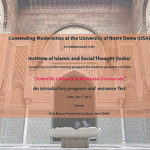The Online programme will equip madrasa graduates to deal with the challenges of a rapidly globalizing world in the information and digital age.
By Ghulam Rasool Dehlvi
New Delhi: Recently, the University of Notre Dame (USA) introduced an online programme to enhance capacity and acquire tools for academic engagement under the Contending Modernities initiative. An introductory programme was held on Jan 7, 2017 at Don Bosco Provincial School/Technical Institute, near Jamia Millia Islamia, New Delhi. This informative programme was most particularly focused on the modalities of reconciliation between the traditional Islamic thought with contemporary scientific and philosophical worldviews. The three-year online course will primarily consist of four parts: Ilm ul-Kalam (Islamic scholastic theology), Islamic jurisprudence (Ilm-ul Fiqh), Muslim history (al-Tarikh al-Islami), and an objective study of different branches of the classical and modern Islamic theology. A certain amount of emphasis will also be laid on the English and Arabic language ability in writing.
A team of three Islamic scholars”who are also madrasa graduates”has been formed to run this long-term course: Dr. Ebrahim Moosa, a Professor of Islamic Studies at the University of Notre Dame, with appointments in the Department of History and the Kroc Institute for International Peace Studies in the Keough School of Global Affairs. Dr. Moosa was trained in both traditional (orthodox) Islamic institutions in India and in the modern academia, specializing in the study of religion at the University of Cape Town.
Dr. Mahan Mirza, a Professor of the Practice in the Contending Modernities programme at the Kroc Institute for International Peace Studies at the University of Notre Dame, who has spent several years working with religious groups around issues of social justice. Dr. Waris Mazhari, a graduate of Dar-ul Uloom Deoband and presently a lecturer at the Department of Islamic Studies, Jamia Millia Islamia, in New Delhi. He has been, for the past 15 years, working as an editor of the Urdu monthly journal Tarjuman-e- Dar-ul Uloom. He also served as Research Associate for Virtual Dialogues, an initiative at Duke University in North Carolina, USA. The programme offers a potentially transformative 3-year educational experience with far-reaching consequences. It will provide the tools, experiences, and intellectual resources to appreciate the virtues of a cosmopolitan outlook consistent with the highest Islamic ideals and in tune with the social and political imperatives of peaceful coexistence in a multifaith and multicultural world. As future leaders and scholars, these graduates will be equipped to deal with the challenges of a rapidly globalizing world in the information and digital age. A select group of 30 recent madrasa graduates will be enrolled in the course in the spring and summer of 2017. Only students who will qualify the test and interview will be eligible for admission to the course.
(Ghulam Rasool is a Delhi based writer.)


COMMENTS